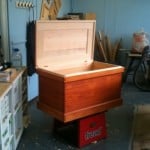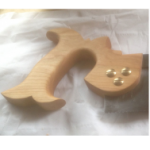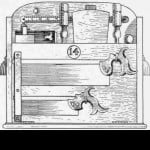Woodworking book recommendations?
- This topic has 10 replies, 9 voices, and was last updated 11 years, 3 months ago by
 Scott.
Scott.
-
AuthorPosts
-
Obviously, actually working with wood is the best way to learn about our craft. I’m actively building a work bench and eagerly awaiting the day I start the first project.
Do you guys have any recommendations for ‘must read’ books to help me learn more about the craft? I’m an avid reader and I’ve thoroughly enjoyed all the woodworking books I have read up to this point. I just want to make sure I’m not missing anything.
I’ve read the Anarchists Toolchest, The Jointer and Cabinet Maker. I will be reading the Essential Woodworker. I’ve also read a few titles by Garrett Hack.
 8 April 2013 at 11:53 pm #10626
8 April 2013 at 11:53 pm #10626Hey Nathan,
I’ve found anything by Jim Tolpin to be of value. His The New Traditional Woodworker: From Tool Set to Skill Set to Mind Set (Popular Woodworking) by Jim Tolpin takes you through making different tools like a straight edge, winding sticks, try square, etc… for your workshop so that you cna build your skillset by making something usefull using only handtools. However, just be aware that he provides an explanation of how to make the tool but does not give step-by-step instructions whihc is fine by me.
Hope that helps.
Jim

Nathan, I asked a similar question in this thread. https://woodworkingmasterclasses.com/discussions/topic/question-for-paul-about-books/
Thanks Dave, I looked around but I guess I just missed it.
I’ve put several of those books listed ‘on hold’ at my local library. Once I get a chance to look through them, I will buy the ones I want to keep around for longer term reference.
Good to think I’m not the only one here interested in reading about woodworking.
9 April 2013 at 1:52 am #10638Nathan,
I’ve been looking and reading for over thirty years and the best teaching book I’ve found is Paul’s “Working Wood 1/2.” When supplemented by the DVDs it provides a solid foundation of the basics. There are other wonderful books that show “what” to do but none better at showing “how” to do it, in my opinion. Whether one uses his techniques or those of others, you will be making a conscious decision as to why.
Cheers,
John

Bob Wearing’s ‘Essential Woodworker’ is the bible. I see a lot of parallels between his techniques and Paul’s. I also very much admire David Charlesworth and Garrett Hack’s works. I have found most of the Taunton books to be complete rubbish, and are simply collections of articles from Fine Woodworking. Better to subscribe (I don’t any more) and read the articles of interest to you.
Chris Becksvoort’s ‘Shaker Legacy’ is well worth acquiring- one of my favourites. I like furniture design books such as Chippendale’s ‘Gentleman and Cabinet-Maker’s Director’ and Hepplewhite’s ‘Guide.’ Breon’s ‘Ruhlmann: Genius of Art Deco.’ David Savage’s ‘Furniture with Soul.’ The Met Museum’s book on Phyfe from their exhibition last year. I am looking forward to Tolpin and Walker’s upcoming book.
I usually take out books from the library, photocopy interesting pages and return them. There are simply too many books to buy them all.
 9 April 2013 at 9:32 am #10652
9 April 2013 at 9:32 am #10652As already mentioned, The Essential Woodworker is an outstanding book. Another one worth reading is The Foundations Of Better Woodworking by Jeff Miller. Anything by Charles H. Hayward is also great reading – they’re out of print now but easy to find on eBay. To get your inspiration going, A Cabinetmaker’s Notebook by Krenov will work wonders – that’s the first woodworking related book I read and the reason I started pursuing it as a hobby!
George.

If you are looking for some new book Shop Woodworking has a sale for the next two days.
http://www.shopwoodworking.com/woodworking-warehouse-sale
 10 April 2013 at 5:34 pm #10713
10 April 2013 at 5:34 pm #10713[quote quote=10705]If you are looking for some new book Shop Woodworking has a sale for the next two days.[/quote]
If you’re not in the US, be extremely cautious about ordering from Shop Woodworking. They are absolutely terrible when it comes to processing and shipping international orders, at least to the UK. Long stories that I’ll not go into here! Just make sure you email them straight after placing the order to make sure they actually do something.
George.
 10 April 2013 at 7:08 pm #10718
10 April 2013 at 7:08 pm #10718I have John Bullars Book : Cabinetmaking a foundation corse. I think is got a different name in US.
Like David Chalesworth writes the odd article for F&C magazine
I also Have Ron Hocks Cutting Edge

Beware! Books are ponderous little demons that will eventually confuse you and keep you out of the shop. 😉
Seriously, the simplicity of Paul’s curriculum has helped me bring my goals back into focus, and I really feel that many of the technical books ( i.e. my three big books on sharpening), jigs, tools, magazine and web articles I have collected are superfluous if not counterproductive. There are some books (on more advanced construction or finishing) that allow me to go beyond Paul’s tutelage for the moment. A few useful ones have already been mentioned in this thread. I must confess that I am now curious to read Aldren Watson’s books…
Books that inspire are another matter. For some it may be a book showcasing Shaker or Craftsman Period furniture, others it may be Traditional English, European or Colonial Period furniture. For me, I prefer more modern designs, and James Krenov would probably be on the top of the list. I do not buy one of his books for techniques; I buy the book to gawk at the thin subtle details of his work, the sensitivity to materials and the subtle east-west fusion influence it demonstrates. I do find it limiting that Krenov did not work on many other forms than free standing cabinets. There are a few tables, but not much else. His more philosophic writing on wood and craft are also inspiring for me and are not dissimilar to Paul’s prose.
-
AuthorPosts
- You must be logged in to reply to this topic.
